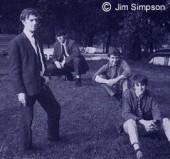Locomotive was a Birmingham-based band that went through some serious evolution in the final years of the 1960's, releasing consistently good music in several genres during their three-year history. Their early line-up included future Traffic flautist Chris Wood.
In contrast to Mike Sheridan & the Nightriders, the Moody Blues, the Move, and the Idle Race, all Birmingham bands that aimed for what--variously--was perceived as the mainstream, whether it was British beat, r&b, or mod-punk, Locomotive started out playing Ska. With Norman Haines (late of a band called The Brumbeats) handling the songwriting, they picked up on Bluebeat as it developed in 1967, but rather than evolving along the next natural step to reggae, Locomotive hung a 90-degree turn into psychedelia.
After recording initially for the Direction label with the single "Broken Heart" b/w "Rudy A Message To You" in late 1967, they moved to EMI's Parlophone label in 1968 and charted in the top 30 with their first single, the lyrical and low-key melodic "Rudi's In Love." In 1969, they released a single called "Mr. Armageddon," a piece of tight, big-band psychedelia that never managed to chart despite a unique sound for its time, doomsday rock with a heavy brass component.
The band cut one album, We Are Everything You See, for Parlophone in 1969, with Dick Heckstall Smith on sax and Chris Wood (by then a member of Traffic) on flute augmenting the core line-up. The album failed to ignite any fires under the public, although it was interesting, containing a pair of songs that had been written for and recorded by the band the United States of America, as well as "Mr. Amageddon." The group also recorded a single incognito for the Transatlantic label under the name Steam Shovel, which resurfaced in the 1990's on the CD re-release of the Parlophone LP. They might've made the jump to the newly formed Harvest label easily enough, but Locomotive broke up just as EMI was getting serious and methodical about psychedelia and progressive rock. Norman Haines later led a band bearing his own name, and Lamb ended up playing drums with Steve Gibbons during the mid-1970's. ~ Bruce Eder, All Music Guide
